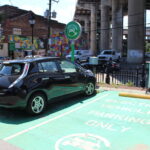7 Truths About Virginia’s Clean Car Standards

EV charging stations are being built across the state. Photo provided by Drive Electric RVA.
VCN and Partners passed Virginia’s Clean Car standards in the 2021 General Assembly. Under this legislation, Virginia will now receive at least 8% more zero-emission cars delivered for sale by 2024. By 2035, new car production will shift to 100% zero-emission vehicles (although gas-powered vehicles will still be on the roads and available to purchase for years to come).
The bottom line: Virginia will have increasing options to buy EVs or hybrid EVs each year, while dealers and consumers will be able to continue to sell and use gas-powered vehicles.
Increasing consumer choice for vehicle purchases and reducing air pollution makes for objectively good policy. However, there are many misconceptions about how the Clean Car Standards affect Virginians. We’re here to set the record straight with 7 truths about the Clean Car Standards.
The 7 Truths About Clean Car Standards in Virginia
Truth 1: You can still buy gas-powered cars.
Once Clean Car standards go into effect in 2024, only about 8% of Virginia’s new vehicles available for purchase will be EVs or hybrid EVs. All major auto manufacturers have issued a litany of pledges in recent years to produce a mostly electric fleet by 2035. Gas-powered models will still be on the market for years to come. Changes don’t happen overnight, so the percentage of gas-powered cars on the road will still be about 75% even by 2035.
Truth 2: You can still drive your gas-powered cars.
Clean Car standards only apply to manufacturers. Thus, regardless of the year, you can drive your gas-powered vehicle for as long as you want. Gas-powered vehicles will still be sold. The true value of the standards is that the number of affordable EV models available at dealerships will gradually increase over time.
Truth 3: Clean car standards HELP Virginia dealerships.
The Virginia Automobile Dealers Association supports Clean Car Standards because there is a demand from Virginia consumers who want EVs. Dealerships in other states that have adopted Clean Car Standards like Virginia have experienced faster revenue growth. If we were to repeal these standards, then we would risk being left behind, hurting our dealerships by leaving them with empty lots and less profits. One of the biggest benefits of the Clean Cars Standards has been that Virginians no longer have to travel across state lines to purchase electric vehicles.
Truth 4: Manufacturers prioritize clean car states.
If we do not remain a clean car state, then we will be left behind as the market shifts towards electric vehicles. If the Clean Car Standards are repealed, then Virginians will not have the opportunity to buy the latest EV models compared to the 16 other states with Clean Car Standards currently in place. Virginians want clean air and clean cars. If we maintain the status quo, then we’ll be one of the first states in line to receive new EV models and stock.
Truth 5: We can exceed energy needs.
The truth is that we have more than enough capacity on our electric grid to reach all current and upcoming energy needs for clean cars. Over the next decade, we will see a massive increase in renewables, energy storage technologies, and investment in grid and transmission infrastructure.
Truth 6: We have the money to build necessary charging infrastructure.
Thanks to the Virginia Clean Economy Act (VCEA) and federal infrastructure funds from the Infrastructure Investment and Jobs Act (IIJA) and Inflation Reduction Act (IRA), we now have the available funds to address Virginia’s EV charging needs. From the $93.6 million settlement out of the Volkswagen emissions scandal to the $106 million from IIJA for charging infrastructure, it’s clear that we have the money. Soon, 95% of Virginians will live within 30 miles of a charger. Furthermore, private companies are investing in and building EV chargers since it’s good business. And, let’s not forget—most EV owners will rarely need public chargers as they will simply plug in their cars at home.
Truth 7: Clean cars are becoming affordable.
The up-front cost of a new EV is rapidly declining. When the additional costs of fuel, maintenance, and repair are taken into account alongside the purchase price, financing, and resale value, EVs save the typical driver $6,000 to $10,000 over the life of the vehicle. Compared to the owner of a gas-powered car, the average EV driver will spend 60% less to power their car and half as much for repair and maintenance. On top of this, EV owners can do the majority of their charging at home, rarely needing to make a stop at a public fast-charger. And, let’s not forget: the more clean cars there are, the more affordable they become.
Accelerating Transportation Electrification
Clean cars support our health. Read more on clean cars through our policy papers and blog posts.
See our policy recommendations in Our Common Agenda Environmental Briefing Book to accelerate the electrification of Virginia’s transportation vehicles.
Thank you to our Network Partners at the Electrification Coalition, The Nature Conservancy, Climate Cabinet Education, Fairfax NAACP, Sierra Club Virginia Chapter, Virginia Clinicians for Climate Action, Chesapeake Climate Action Network, and Southern Environmental Law Center for providing expertise on these policy solutions.




